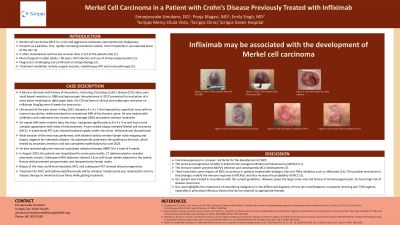Monday Poster Session
Category: IBD
P2238 - Merkel Cell Carcinoma in a Patient With Crohn's Disease Previously Managed With Infliximab
Monday, October 23, 2023
10:30 AM - 4:15 PM PT
Location: Exhibit Hall

Has Audio

Emuejevuoke Umukoro, DO
Scripps Mercy Hospital
San Ysidro, CA
Presenting Author(s)
Emuejevuoke Umukoro, DO1, Pooja Magavi, MD2, Emily Singh, MD2
1Scripps Mercy Hospital, San Ysidro, CA; 2Scripps Green Hospital, La Jolla, CA
Introduction: Merkel cell carcinoma is a rare and aggressive cutaneous neuroendocrine malignancy. It arises more frequently in older adults, with an average age of onset of 69 years, mainly in sun-exposed areas of the skin. It often metastasizes and has low survival rates.
Case Description/Methods: A 68-year-old male with history of ileocolonic, stricturing, fistulizing Crohn’s disease (CD) status post small bowel resection in 1988 and laparoscopic ileocolectomy in 2017 presented for evaluation of a mass lesion involving his right upper back. He initially developed a back papule in December 2021 that gradually increased in size over the next few months. Of note, his CD had been in clinical and endoscopic remission on infliximab 5mg/kg every 8 weeks for years prior. Ultrasound of the back lesion in May 2022 showed a 4 x 3 x 1.4cm hypoechoic superficial mass with no internal vascularity, redemonstrated on noncontrast MRI of the thoracic spine. He underwent two incision and drainage (I&D) procedures and was treated with antibiotics without resolution. On repeat MRI with and without contrast eight months later, the mass had a more complex appearance with areas of enhancement and had grown significantly to 8 x 4 x 7cm. A core needle biopsy revealed Merkel cell carcinoma. Infliximab was stopped when the diagnosis was confirmed. A whole-body PET scan showed localized uptake within the lesion. Wide excision of the mass was performed, with bilateral axillary sentinel lymph node mapping and biopsy, negative for metastatic disease. He subsequently underwent skin grafting to the back, which failed, though the wound is healing by secondary intention. He is currently awaiting complete wound healing before initiating adjuvant radiation therapy and will transition to either ustekinumab or risankizumab for management of CD.
Discussion: Immunosuppression is a known risk factor for the development of Merkel cell carcinoma. In addition, there may be an increased risk of non-melanoma skin cancer development in patients treated with anti-tumor necrosis factor (TNF) α inhibitors, such as infliximab. However, the specific association between anti-TNFs and Merkel cell, and the mechanism by which this may occur, has not been fully elucidated. Our case highlights the importance of considering malignancy in the differential diagnosis of new skin manifestations, especially presumed infectious lesions that do not respond to appropriate therapy, in patients with inflammatory bowel disease receiving anti-TNFα agents.

Disclosures:
Emuejevuoke Umukoro, DO1, Pooja Magavi, MD2, Emily Singh, MD2. P2238 - Merkel Cell Carcinoma in a Patient With Crohn's Disease Previously Managed With Infliximab, ACG 2023 Annual Scientific Meeting Abstracts. Vancouver, BC, Canada: American College of Gastroenterology.
1Scripps Mercy Hospital, San Ysidro, CA; 2Scripps Green Hospital, La Jolla, CA
Introduction: Merkel cell carcinoma is a rare and aggressive cutaneous neuroendocrine malignancy. It arises more frequently in older adults, with an average age of onset of 69 years, mainly in sun-exposed areas of the skin. It often metastasizes and has low survival rates.
Case Description/Methods: A 68-year-old male with history of ileocolonic, stricturing, fistulizing Crohn’s disease (CD) status post small bowel resection in 1988 and laparoscopic ileocolectomy in 2017 presented for evaluation of a mass lesion involving his right upper back. He initially developed a back papule in December 2021 that gradually increased in size over the next few months. Of note, his CD had been in clinical and endoscopic remission on infliximab 5mg/kg every 8 weeks for years prior. Ultrasound of the back lesion in May 2022 showed a 4 x 3 x 1.4cm hypoechoic superficial mass with no internal vascularity, redemonstrated on noncontrast MRI of the thoracic spine. He underwent two incision and drainage (I&D) procedures and was treated with antibiotics without resolution. On repeat MRI with and without contrast eight months later, the mass had a more complex appearance with areas of enhancement and had grown significantly to 8 x 4 x 7cm. A core needle biopsy revealed Merkel cell carcinoma. Infliximab was stopped when the diagnosis was confirmed. A whole-body PET scan showed localized uptake within the lesion. Wide excision of the mass was performed, with bilateral axillary sentinel lymph node mapping and biopsy, negative for metastatic disease. He subsequently underwent skin grafting to the back, which failed, though the wound is healing by secondary intention. He is currently awaiting complete wound healing before initiating adjuvant radiation therapy and will transition to either ustekinumab or risankizumab for management of CD.
Discussion: Immunosuppression is a known risk factor for the development of Merkel cell carcinoma. In addition, there may be an increased risk of non-melanoma skin cancer development in patients treated with anti-tumor necrosis factor (TNF) α inhibitors, such as infliximab. However, the specific association between anti-TNFs and Merkel cell, and the mechanism by which this may occur, has not been fully elucidated. Our case highlights the importance of considering malignancy in the differential diagnosis of new skin manifestations, especially presumed infectious lesions that do not respond to appropriate therapy, in patients with inflammatory bowel disease receiving anti-TNFα agents.

Figure: Figure 1. Right upper back lesion after initial I&D (A) and after excision (B).
Disclosures:
Emuejevuoke Umukoro indicated no relevant financial relationships.
Pooja Magavi indicated no relevant financial relationships.
Emily Singh indicated no relevant financial relationships.
Emuejevuoke Umukoro, DO1, Pooja Magavi, MD2, Emily Singh, MD2. P2238 - Merkel Cell Carcinoma in a Patient With Crohn's Disease Previously Managed With Infliximab, ACG 2023 Annual Scientific Meeting Abstracts. Vancouver, BC, Canada: American College of Gastroenterology.

